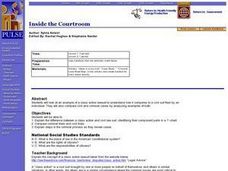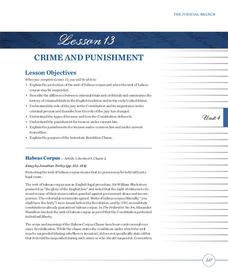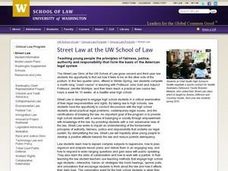Curated OER
Laws...Who Needs Them?
Who needs laws? Junior high schoolers sure do! Provide your 7th-9th graders with an understandng about why laws are important and how they are used to create a functioning society. Learners use a series of handouts and readings to build...
Street Law
Mock Trial - Brooks v. Lawrence and the Metro City Police Department
An incident with a Swiss Army knife leads to a suit against the police department for battery, false arrest, and intentional infliction of emotional distress in the Brooks v. Lawrence & the Metro City Police Department mock trial...
Curated OER
An Introduction to Law
With so many different types of law, it can be difficult for learners to discern which is which! Use a newspaper to give tangible examples of various types of law, including criminal, civil, consumer, family, local, state, federal and...
Curated OER
An Introduction To Law
Students identify 4 branches of law-criminal, civil, consumer, and family. using a newspaper, they locate examples of how laws affect citizens on a daily basis.
Teaching Tolerance
The War on Drugs—Mechanisms and Effects
The war on drugs doesn't have definite results. An interesting lesson examines the social, political, and economic effect of the war on drugs. Academics learn how the war on drugs has led to mass incarcerations and negatively affected...
Curated OER
Tort Law -- Negligence
Students review the differences between criminal and civil law. In groups, they examine high-profile cases and identify any act of negligence. They create a list of the elements of negligence and answer discussion questions as they watch...
Curated OER
Inside the Courtroom
Twelfth graders explain the difference between a class action and civil law suit. In groups, they compare and contrast criminal and civil trials and review various cases. They determine the place of law in the American constitutional...
Curated OER
Ira Ritter, Et Al., V. Jerry And Ruth Stanton Lesson 2: What Does a Jury Do Anyway?
Students investigate how a jury is chosen, and what the rights and responsibilities of juries are. They examine case studies to determine the role of the jury in both criminal and civil cases.
iCivics
We the Jury
Learners take on the roles of jurors in a civil case to evaluate evidence and determine a verdict in this engaging online interactive experience.
Curated OER
Do We Need a Permanenet International Criminal Court?: War Crimes, Violence, International Law and Politics, Nuremberg
In this lesson, young scholars explore the history, relevance and current application of international tribunals for war crimes. Students look at cases from the Nuremberg trials, Tokyo trials and the Bosnian War.
Curated OER
What is a war criminal?
Young scholars read the story Former president denies war crimes. They then read three different situations and discuss the situations. Students draw up plans for fair war, young scholars are divided into two equal halves. The...
Curated OER
Criminal or Hero
Fifth graders explore the origins of slavery. In this US History lesson, 5th graders create a map of the United States that shows where slavery existed. Students examine the life of a Northern slave through the use of a video.
Judicial Learning Center
The Players in the Courtroom
Courtrooms are complicated. In addition to the many rules, there are a number of people whose jobs are not very clear to the casual courtroom observer. With the resource, individuals identify some of these roles and review more...
Judicial Learning Center
Your Day in Court
Whether out of choice or necessity, people want to know what will happen on a typical day in court. A helpful lesson walks scholars in the field of criminology through the trial process from opening statements to the final verdict.
Curated OER
Indiana Courts: How Do They Work?
Students identify the branches of Indiana's judicial system and determine the differences between the different courts and different types of cases. Students create a flow chart showing how a court case works its way through the legal...
Judicial Learning Center
The Appeal Process
Why doesn't the Supreme Court hear testimony from witnesses? How do they complete an entire proceeding in less than two hours? A helpful lesson guides scholars of criminology through these and other questions by explaining how appeals...
Heritage Foundation
Crime and Punishment
You wouldn't give someone a 10-day timeout for eating a piece of candy. The US government, too, does not believe in unreasonable punishment. A variety of exercises exploring the clauses of the US Constitution prompts class members to...
Judicial Learning Center
The Judge and the Jury
Unless you are a lawyer, you might not understand just how unrealistic Law and Order and other legal dramas actually are. Here's a great resource to help scholars of criminology gain a more realistic perspective. The lesson outlines the...
Curated OER
Tort Law
Students study the concept of negligence. They recognize the difference between civil and criminal law and examine the factors that courts consider when considering if there is a duty and whether it has been breached. They argue either...
Curated OER
The Legacy of the Warren Court
Students examine the major decisions by the Supreme Court when Warren was the Chief Justice. In groups, they research the life and other works of Earl Warren and discuss how ones background can influence decisions. They also examine...
Curated OER
Role Playing Free Speech
Young scholars conduct research into looking at a free-speech issue. They role play the events surrounding a court case. The lesson includes guiding questions to help create context and determine areas of further study. The presentation...
Teaching Tolerance
Jim Crow as a Form of Racialized Social Control
Just because slavery was illegal doesn't mean it went away ... Jim Crow Laws took its place. An eye-opening lesson focuses on how Jim Crow Laws were used as a form of racial social control against African Americans in the United States....
Teaching Tolerance
Mass Incarceration as a Form of Racialized Social Control
Mass incarceration: A result of a tough stance on crime or racial discrimination, you decide. Academics explore the history and reasons behind mass incarcerations in the United States and its impact on ethnic communities. The...
Teaching Tolerance
Dismantling Racial Caste
It's time to end racism. The final installment of the series encourages scholars to consider what is needed to ended the racial caste system in the U.S. Young historians complete group discussion, written prompt, and a hands-on-activity...
Other popular searches
- Civil Criminal Law
- Civil and Criminal Cases
- Criminal and Civil Law
- Civil vs. Criminal Law
- Civil vs Criminal Law
- Criminal Versus Civil Law
- Civil and Criminal Procedure
- Civil Criminal

























